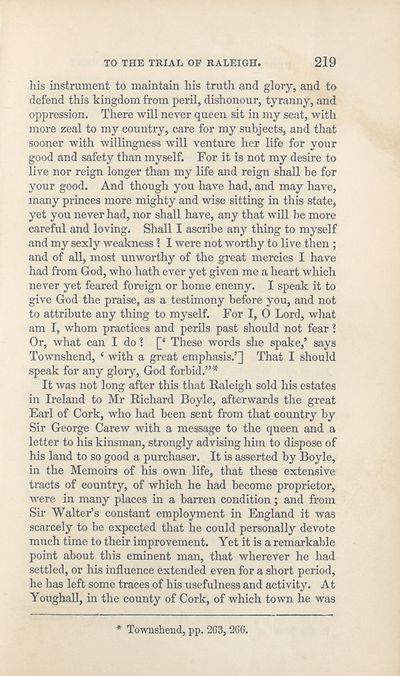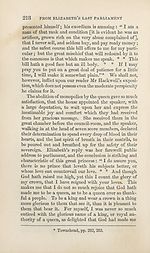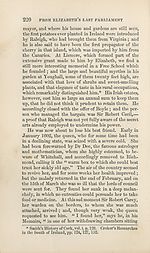Download files
Complete book:
Individual page:
Thumbnail gallery: Grid view | List view

TO THE TRIAL OF RALEIGH.
219
his instrument to maintain his truth and glory, and to
defend this kingdom from peril, dishonour, tyranny, and
oppression. There will never queen sit in my seat, with
more zeal to my country, care for my subjects, and that
sooner with willingness will venture her life for your
good and safety than myself. For it is not my desire to
live nor reign longer than my life and reign shall be for
your good. And though you have had, and may have,
many princes more mighty and wise sitting in this state,
yet you never had, nor shall have, any that will he more
careful and loving. Shall I ascribe any thing to myself
and my sexly weakness \ I were not worthy to live then ;
and of all, most unworthy of the great mercies I have
had from God, who hath ever yet given me a heart which
never yet feared foreign or home enemy. I speak it to
give God the praise, as a testimony before you, and not
to attribute any thing to myself. For I, O Lord, what
am I, whom practices and perils past should not fear l
Or, what can I do 2 These words she spake,’ says
Townshend, ‘ with a great emphasis.’] That I should
speak for any glory, God forbid.”*
It was not long after this that Raleigh sold his estates
in Ireland to Mr Richard Boyle, afterwards the great
Earl of Cork, who had been sent from that country by
Sir George Carew with a message to the queen and a
letter to his kinsman, strongly advising him to dispose of
his land to so good a purchaser. It is asserted by Boyle,
in the Memoirs of his own life, that these extensive
tracts of country, of which he had become proprietor,
were in many places in a barren condition; and from
Sir Walter’s constant employment in England it was
scarcely to be expected that he could personally devote
much time to their improvement. Yet it is a remarkable
point about this eminent man, that wherever he had
settled, or his influence extended even for a short period,
he has left some traces of his usefulness and activity. At
Youghall, in the county of Cork, of which town he was
* Townshend, pp. 263, 266.
219
his instrument to maintain his truth and glory, and to
defend this kingdom from peril, dishonour, tyranny, and
oppression. There will never queen sit in my seat, with
more zeal to my country, care for my subjects, and that
sooner with willingness will venture her life for your
good and safety than myself. For it is not my desire to
live nor reign longer than my life and reign shall be for
your good. And though you have had, and may have,
many princes more mighty and wise sitting in this state,
yet you never had, nor shall have, any that will he more
careful and loving. Shall I ascribe any thing to myself
and my sexly weakness \ I were not worthy to live then ;
and of all, most unworthy of the great mercies I have
had from God, who hath ever yet given me a heart which
never yet feared foreign or home enemy. I speak it to
give God the praise, as a testimony before you, and not
to attribute any thing to myself. For I, O Lord, what
am I, whom practices and perils past should not fear l
Or, what can I do 2 These words she spake,’ says
Townshend, ‘ with a great emphasis.’] That I should
speak for any glory, God forbid.”*
It was not long after this that Raleigh sold his estates
in Ireland to Mr Richard Boyle, afterwards the great
Earl of Cork, who had been sent from that country by
Sir George Carew with a message to the queen and a
letter to his kinsman, strongly advising him to dispose of
his land to so good a purchaser. It is asserted by Boyle,
in the Memoirs of his own life, that these extensive
tracts of country, of which he had become proprietor,
were in many places in a barren condition; and from
Sir Walter’s constant employment in England it was
scarcely to be expected that he could personally devote
much time to their improvement. Yet it is a remarkable
point about this eminent man, that wherever he had
settled, or his influence extended even for a short period,
he has left some traces of his usefulness and activity. At
Youghall, in the county of Cork, of which town he was
* Townshend, pp. 263, 266.
Set display mode to:
![]() Universal Viewer |
Universal Viewer | ![]() Mirador |
Large image | Transcription
Mirador |
Large image | Transcription
| Antiquarian books of Scotland > Politics & government > Life of Sir Walter Raleigh > (225) |
|---|
| Permanent URL | https://digital.nls.uk/113655104 |
|---|
| Description | Thousands of printed books from the Antiquarian Books of Scotland collection which dates from 1641 to the 1980s. The collection consists of 14,800 books which were published in Scotland or have a Scottish connection, e.g. through the author, printer or owner. Subjects covered include sport, education, diseases, adventure, occupations, Jacobites, politics and religion. Among the 29 languages represented are English, Gaelic, Italian, French, Russian and Swedish. |
|---|

